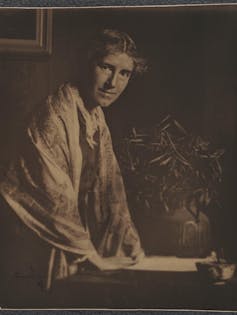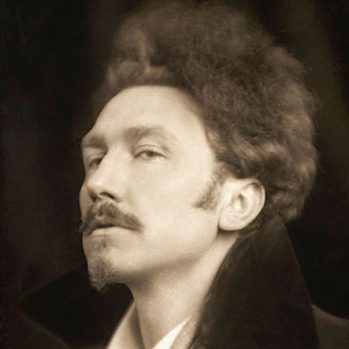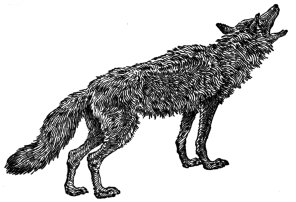
from Herland (1915)
CHAPTER 7. Our Growing Modesty
Being at last considered sufficiently tamed and trained to be trusted with scissors, we barbered ourselves as best we could. A close-trimmed beard is certainly more comfortable than a full one. Razors, naturally, they could not supply.
“With so many old women you’d think there’d be some razors,” sneered Terry. Whereat Jeff pointed out that he never before had seen such complete absence of facial hair on women.
“Looks to me as if the absence of men made them more feminine in that regard, anyhow,” he suggested.
“Well, it’s the only one then,” Terry reluctantly agreed. “A less feminine lot I never saw. A child apiece doesn’t seem to be enough to develop what I call motherliness.”
Terry’s idea of motherliness was the usual one, involving a baby in arms, or “a little flock about her knees,” and the complete absorption of the mother in said baby or flock. A motherliness which dominated society, which influenced every art and industry, which absolutely protected all childhood, and gave to it the most perfect care and training, did not seem motherly—to Terry.
We had become well used to the clothes. They were quite as comfortable as our own—in some ways more so—and undeniably better looking. As to pockets, they left nothing to be desired. That second garment was fairly quilted with pockets. They were most ingeniously arranged, so as to be convenient to the hand and not inconvenient to the body, and were so placed as at once to strengthen the garment and add decorative lines of stitching.
In this, as in so many other points we had now to observe, there was shown the action of a practical intelligence, coupled with fine artistic feeling, and, apparently, untrammeled by any injurious influences.
Our first step of comparative freedom was a personally conducted tour of the country. No pentagonal bodyguard now! Only our special tutors, and we got on famously with them. Jeff said he loved Zava like an aunt—“only jollier than any aunt I ever saw”; Somel and I were as chummy as could be—the best of friends; but it was funny to watch Terry and Moadine. She was patient with him, and courteous, but it was like the patience and courtesy of some great man, say a skilled, experienced diplomat, with a schoolgirl. Her grave acquiescence with his most preposterous expression of feeling; her genial laughter, not only with, but, I often felt, at him—though impeccably polite; her innocent questions, which almost invariably led him to say more than he intended—Jeff and I found it all amusing to watch.
He never seemed to recognize that quiet background of superiority. When she dropped an argument he always thought he had silenced her; when she laughed he thought it tribute to his wit.
I hated to admit to myself how much Terry had sunk in my esteem. Jeff felt it too, I am sure; but neither of us admitted it to the other. At home we had measured him with other men, and, though we knew his failings, he was by no means an unusual type. We knew his virtues too, and they had always seemed more prominent than the faults. Measured among women—our women at home, I mean—he had always stood high. He was visibly popular. Even where his habits were known, there was no discrimination against him; in some cases his reputation for what was felicitously termed “gaiety” seemed a special charm.
But here, against the calm wisdom and quiet restrained humor of these women, with only that blessed Jeff and my inconspicuous self to compare with, Terry did stand out rather strong.
As “a man among men,” he didn’t; as a man among—I shall have to say, “females,” he didn’t; his intense masculinity seemed only fit complement to their intense femininity. But here he was all out of drawing.
Moadine was a big woman, with a balanced strength that seldom showed. Her eye was as quietly watchful as a fencer’s. She maintained a pleasant relation with her charge, but I doubt if many, even in that country, could have done as well.
He called her “Maud,” amongst ourselves, and said she was “a good old soul, but a little slow”; wherein he was quite wrong. Needless to say, he called Jeff’s teacher “Java,” and sometimes “Mocha,” or plain “Coffee”; when specially mischievous, “Chicory,” and even “Postum.” But Somel rather escaped this form of humor, save for a rather forced “Some ‘ell.”
“Don’t you people have but one name?” he asked one day, after we had been introduced to a whole group of them, all with pleasant, few-syllabled strange names, like the ones we knew.
“Oh yes,” Moadine told him. “A good many of us have another, as we get on in life—a descriptive one. That is the name we earn. Sometimes even that is changed, or added to, in an unusually rich life. Such as our present Land Mother—what you call president or king, I believe. She was called Mera, even as a child; that means ‘thinker.’ Later there was added Du—Du-Mera—the wise thinker, and now we all know her as O-du-mera—great and wise thinker. You shall meet her.”













